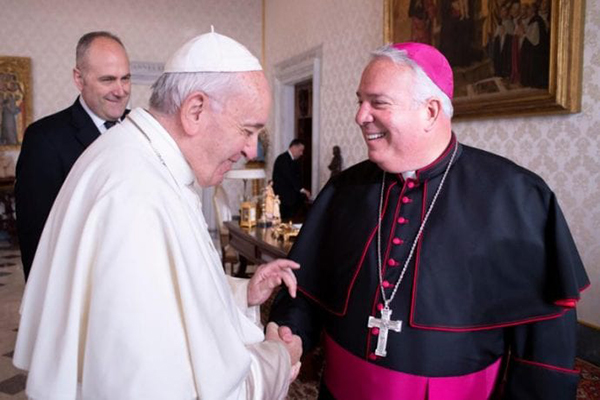
By Christopher White, National Correspondent
NEW YORK — Pope Francis has tapped Bishop Nelson Perez to be the new Archbishop of Philadelphia, replacing retiring Archbishop Charles Chaput with a native priest of the archdiocese.
The announcement was made Jan. 23 by the Vatican.
Many Vatican observers view Bishop Perez’s appointment as a turning point, replacing someone widely viewed as one of the country’s most vocal conservative prelates with a theological and political moderate.
Bishop Perez, age 58, has led the Diocese of Cleveland since 2017 and was previously an auxiliary bishop of Rockville Centre. Prior to entering Philadelphia’s St. Charles Borromeo Seminary, he taught at a Catholic elementary school in Puerto Rico.
Along with several parish assignments during his early years in Cleveland, Bishop Perez served as assistant director of the Office for Hispanic Catholics and as the founding director of the Catholic Institute for Evangelization.
A native of Miami, Florida, in recent years he has emerged as one of the leading figures among U.S. Hispanic Catholics through his work as chairman of the United States Conference of Catholic Bishops’ (USCCB) Committee on Cultural Diversity in the Church. He will become the first Hispanic to lead the archdiocese.
Last fall, following the publication of “How America Wanted to Change the Pope,” a book which raised questions about the U.S. hierarchy and the extent to which they’ve aligned themselves with the Francis papacy, Bishop Perez sought to downplay any differences, saying most American Catholics, including bishops, are supportive of the pope.
“There are differences of opinion, and Americans are very opinionated, but my overwhelming experience of both bishops and the people is one of great love for Pope Francis,” Bishop Perez told The Tablet at the time.
Bishop Perez said that when he hears reports of American opposition to the pope, “I don’t exactly know what they’re talking about.”
“I understand that there are some factions, but they do not represent what I’ve experienced in Philadelphia, in New York where I was, and now in Cleveland,” Bishop Perez said. “It’s just simply not there. I think there’s great love for the Church and great love for the Holy Father.”
In one of his most recent public events in Cleveland, Bishop Perez joined 600 faith leaders and the city’s medical community to celebrate the legacy of Martin Luther King, Jr.
King “wanted to be a voice for the oppressed following the call of God,” he told them. “He was a man who believed in his God. He said love was not determined by the color of our skin; we are all created in the image of God.”
“Long live Dr. King,” he said.
Bishop Perez has also been vocal on issues such as immigration, gun violence, and racism.
In 2015 Pope Francis visited Philadelphia, one of the strongholds of U.S. Catholicism, for the World Meeting of Families. The one million-member archdiocese, with over 200 parishes and nearly 500 diocesan priests, has long been considered one of the most influential in the United States, however, in recent decades it has been plagued by fallout from clergy abuse.
Although he has come under criticism for closing parishes and diocesan schools and the selling of the 72-acre seminary for $43.5 million, Archbishop Chaput is largely positively credited for his financial oversight of the diocese since he was appointed to lead it in 2011.
Upon turning 75 in September, Archbishop Chaput submitted his resignation to the pope and spoke publicly of his desire for the pope to accept it. In recent years, Archbishop Chaput expressed skepticism about Pope Francis’s willingness to provide a cautious opening to communion for divorced and remarried Catholics. That, along with the pope not naming him a cardinal, although it has long been tradition for the post, was viewed by many as an outward sign of tension between the two figures.
Speaking recently on the latest wave of abuse scandals, Archbishop Chaput differed with Pope Francis saying that “clericalism” is not the root cause of the crisis, but merely a potential factor.
“Not naming the real problem, for what it is – a pattern of predatory homosexuality and a failure to weed that out from church life – is an act of self-delusion,” he said last year. During his years as a bishop, he was known for his strong advocacy of traditional marriage and religious liberty.
Following Bishop Perez’s installation, which is expected ahead of the upcoming Lenten season, he will become the tenth bishop to lead the archdiocese.
This story will be updated.
